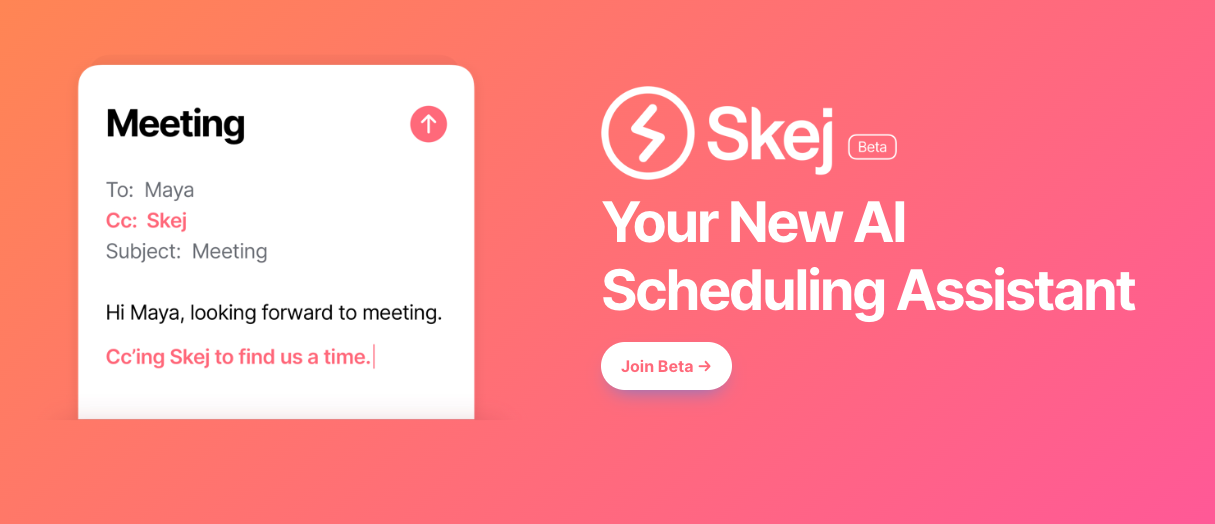
Artificial intelligence (AI) may not yet be poised to replace Google Search, but it’s proving its worth in more niche applications—like managing everyday tasks such as scheduling meetings. Enter Skej, a promising new startup offering an AI assistant designed to streamline the often cumbersome process of finding the best time for everyone to meet.
Skej stands out from other scheduling tools, such as Calendly, by eliminating the need to manually browse through someone’s availability. Instead, if someone sends you a Calendly link, Skej scans it to identify mutually available slots and schedules the meeting for you.
Paul Canetti, Skej’s co-founder and CEO, captures the sentiment perfectly: “I’ve never met anyone in my life who loves scheduling meetings.”
Paul Canetti is no stranger to the startup scene. A seasoned New York-based entrepreneur, Canetti previously founded and sold the no-code app development platform MAZ Systems. He also worked on another meetings startup, Bounce House, which was acquired by Declare Health and rebranded to Clickeasy.com. Although Clickeasy has since shut down, the same founding team from these past ventures—including Canetti, his brother Justin, CTO Anindya Mondal, and Simon Baumer—reunited to create Skej. Sadly, Baumer passed away three months after founding Skej last August, but his contributions to the product’s core functionality are commemorated on the company’s website.
Skej differentiates itself through its user-friendly approach. Unlike conventional scheduling platforms that might require you to download an app or visit a website, Skej operates entirely through email integration. By simply adding Skej’s email address to your conversation, the AI assistant takes over, managing your scheduling needs seamlessly. Future updates will extend this functionality to text chats via a dedicated phone number.
Currently, Skej integrates with popular email platforms like Gmail and Outlook, as well as meeting tools such as Zoom and Google Calendar. Support for Outlook Calendar is expected in the coming weeks. This wide compatibility ensures that Skej can adapt to the tools and workflows users are already familiar with, avoiding the need for any major changes.
Here’s how using Skej works in practice: When scheduling an interview with TechCrunch, Paul Canetti simply replied, “Skej, can you offer some times that might work this week?” The AI assistant then responded with a list of available options and a link to automatically connect calendars to find a suitable time. Once a preference was chosen, Skej confirmed the meeting and added it to the calendar.
The efficiency of Skej’s system lies in its permission-based access to the user’s calendar. In the case of Paul Canetti, Skej was authorized to send calendar invites on his behalf. For internal teams, where multiple people need to coordinate schedules, Skej can automate the entire process, booking meetings without any back-and-forth communication.
Underpinning Skej’s capabilities is a combination of various large language models (LLMs) that interpret email language and translate it into actionable data. This data feeds into Skej’s proprietary system, dubbed “the brain.” According to Canetti, “The Skej brain is like a scheduling engine, almost like a marketplace for matching times. It negotiates various factors such as time zones, conflicts, and preferences to find a suitable match.”
Once a match is found, the LLM crafts a natural-sounding message to relay the information back to the user. This sophisticated technology enables Skej to handle complex scheduling scenarios effortlessly.
Skej also offers users the ability to categorize contacts associated with different calendars, such as separating work and personal calendars. In the future, Canetti envisions Skej using natural language processing to automate this categorization. For now, users can set up their preferences and integrations through a traditional dashboard.
Interestingly, Skej has no plans to develop a standalone app. Canetti explains, “It’s funny, it’s a question we get from VCs a lot…it’s like, ‘well, eventually you’re gonna have an app, right?’ But Skej is meant to be totally agnostic to the tools you already use and like, and it can adapt to whatever workflow you’ve already got going on. It’s not forcing you into a particular app or a particular thing.”
Skej’s Growing Popularity
Skej has attracted a range of pre-seed investors, including Betaworks, Mozilla Ventures, Stem AI, Spice Capital, Deftly.vc, and Differential Ventures. The initial funding round raised just under a million dollars. Skej’s remotely distributed team consists of the three co-founders and two additional full-time engineers.
Currently in public beta, Skej boasts over 1,000 users. While the service is free during this testing phase, a paid tier will be introduced as the team gathers more feedback and refines the product.
Key Features of Skej
- Seamless Integration: Works with popular email platforms and meeting tools.
- Automated Scheduling: Finds mutually available times without manual intervention.
- Permission-Based Access: Requires user authorization to access calendars.
- LLM Technology: Uses advanced language models to interpret emails and schedule meetings.
- Customization: Allows categorization of contacts and calendars.
- No App Required: Operates through email and, soon, text messages.
| Feature | Skej | Calendly |
|---|---|---|
| Integration | Email platforms (Gmail, Outlook), Zoom | Calendly-specific interface |
| Scheduling Method | Email-based AI assistant | Manual browsing of availability |
| Calendar Access | Permission-based | Publicly shared availability |
| User Interface | No app required | Web and app-based |
| Customization | Contact categorization | Limited |
| Technology | LLM and proprietary scheduling engine | Traditional scheduling algorithms |
- Efficiency: Saves time by automating the scheduling process.
- Flexibility: Adapts to existing tools and workflows.
- User-Friendly: Easy to use without the need for additional software.
- Advanced Technology: Leverages cutting-edge AI to handle complex scheduling.
Skej represents a significant step forward in AI-powered scheduling, offering a solution that blends the efficiency of automation with the intelligence of human-like decision-making. As the service continues to evolve and expand its capabilities, it promises to become an indispensable tool for professionals and teams alike.
Related News:
Featured Image courtesy of DALL-E by ChatGPT
